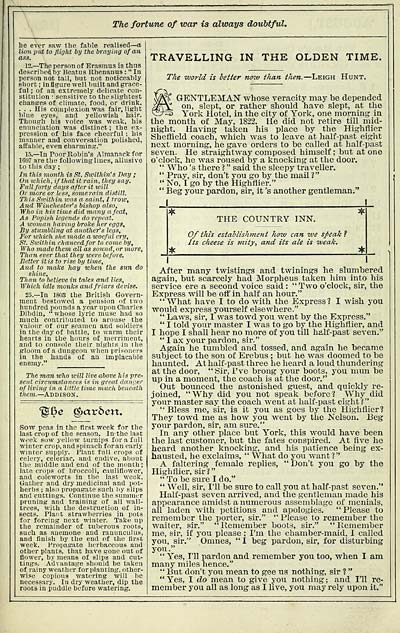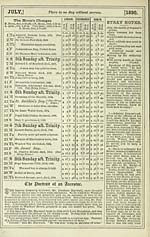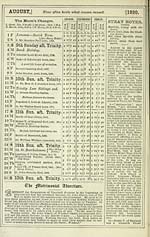Download files
Complete book:
Individual page:
Thumbnail gallery: Grid view | List view

The fortune of war is always doubtful.
be ever saw the fable realised— a
lion put to flight by the braying of an
ass.
12.— The person of Erasmus is thus
described by Beatus Rhenanus : " In
person not tall, but not noticeably
short ; in figure well built and grace-
ful ; of an extremely delicate con-
stitution : sensitive to the slightest
changes of climate, food, or drink.
. . . His complexion was fair, light
blue eyes, and yellowish hair.
Though his voice was weak, his
enunciation was distinct ; the ex-
pression of his face cheerful ; his
manner and conversation polished,
affable, even charming."
15.— In Poor Robin's Almanack for
1G97 are the following lines, allusive
to this day;
In this month is fit. Swiihin's Day ;
On which, if that it rain, they say.
Full forty days after it will
Or more or less, some rain distill.
This Swithin loas a saint, I trow,
And Winchester's bishop also,
Who in his time did many a feat,
As Popish legends do repeat.
A woman having broke her eggs.
By stumbling at another's legs,
For which she made a woefiil cry,
St. Swithin chanced for to come by,
Who made them all as sound, or more,
Than ever that they ivere before.
Better it is to rise by time,
And to make hay' when the sun do
shine,
Than to believe in tales and lies,
Which idle monks and friars devise.
25.— In 1803 the British Govern-
ment bestowed a pension of two
hundred pounds a year upon Charles
Dibdin, "whose lyric muse had so
much contributed to arouse the
valour of our seamen and soldiers
in the day of battle, to warm their
hearts in the hours of merriment,
and to console their nights in ihe
gloom of a dungeon when prisoners
in the hands of an implacable
enemy."
The man who will live above his pre-
sent circumstances is in great dancer
of living in a little time much beneath
them.— Addison.
e g>ar6m.
Sow peas in the first week for the
last crop of the season. In the last
week sow yellow turnips for a full
winter crop, and spinach for an early
winter supply. Plant full crops of
celery, celeriac, and endive, about
the middle and end of the month ;
late crops of broccoli, cauliflower,
and coleworts in the last week.
Gather and dry medicinal and pot-
herbs ; also propagate such by slips
and cuttings. Continue the summer
pruning and training of all wall-
trees, with the destruction of in-
sects. Plant strawberries in pots
for forcing next winter. Take up
the remainder of tuberous roots,
such as anemone and ranunculus,
and finish by the end of the first
week. Propagate herbaceous and
other plants, that have gone out of
flower, by means of slips and cut-
tings. Advantage should be taken
of rainy weather for planting, other-
wise copious watering will be
necessary. In dry weather, dip the
roots in puddle before watering.
TRAVELLING IN THE OLDEN TIME.
The world is better noiv than then. — Leigh Hunt.
GENTLEMAN whose veracity may be depended
£ on, slept, or rather should have slept, at the
^ York Hotel, in the city of York, one morning in
the month of May, 1822. He did not retire till mid-
night. Having taken his place by the Highflier
Sheffield coach, which was to leave at half -past eight
next morning, he gave orders to be called at half -past
seven. He straightway composed himself ; but at one
o'clock, he was roused by a knocking at the door.
" Who 's there ? " said the sleepy traveller.
" Pray, sir, don't you go by the mail ?"
" No, I go by the Highflier."
" Beg your pardon, sir, it 's another gentleman."
*
THE COUNTRY INN.
*
Of this establishment how can we speak ?
Its cheese is mity, and its ale is weak.
* *
I
After many twistings and twinings he slumbered
again, but scarcely had Morpheus taken him into his
service ere a second voice said : "Two o'clock, sir, the
Express will be off in half an hour."
"What have I to do with the Express 1 ? I wish you
would express yourself elsewhere."
" Laws, sir, I was towd you went by the Express."
" I told your master I was to go by the Highflier, and
I hope I shall hear no more of you till half -past seven."
" I ax your pardon, sir."
Again he tumbled and tossed, and again he became
subject to the son of Erebus ; but he was doomed to be
haunted. At half -past three he heard a loud thundering
at the door, " Sir, I've brong your boots, you mun be
up in a moment, the coach is at the door."
Out bounced the astonished guest, and quickly re-
joined, "Why did you not speak before? Why did
your master say the coach went at half-past eight ? "
"Bless me, sir, is it you as goes by the Highflier?
They towd me as how you went by the Nelson. Beg
your pardon, sir, am sure."
In any other place but York, this would have been
the last customer, but the fates conspired. At five he
heard another knocking, and his patience being ex-
hausted, he exclaims, " What do you want?"
A faltering female replies, "Don't you go by the
Highflier, sir ? "
"To be sure I do."
" Well, sir, I'll be sure to call you at half-past seven."
Half -past seven arrived, and the gentleman made his
appearance amidst a numerous assemblage of menials,
all laden with petitions and apologies. "Please to
remember the porter, sir." " Please to remember the
waiter, sir." "Remember boots, sir." "Remember
me, sir, if you please ; I'm the chamber-maid, I called
you, sir." Omnes, " I beg pardon, sir, for disturbing
you ."
" Yes, I'll pardon and remember you too, when I am
many miles hence."
" But don't you mean to gee us nothing, sir ? "
"Yes, I do mean to give you nothing; and I'll re-
member you all as long as I live, you may rely upon it."
be ever saw the fable realised— a
lion put to flight by the braying of an
ass.
12.— The person of Erasmus is thus
described by Beatus Rhenanus : " In
person not tall, but not noticeably
short ; in figure well built and grace-
ful ; of an extremely delicate con-
stitution : sensitive to the slightest
changes of climate, food, or drink.
. . . His complexion was fair, light
blue eyes, and yellowish hair.
Though his voice was weak, his
enunciation was distinct ; the ex-
pression of his face cheerful ; his
manner and conversation polished,
affable, even charming."
15.— In Poor Robin's Almanack for
1G97 are the following lines, allusive
to this day;
In this month is fit. Swiihin's Day ;
On which, if that it rain, they say.
Full forty days after it will
Or more or less, some rain distill.
This Swithin loas a saint, I trow,
And Winchester's bishop also,
Who in his time did many a feat,
As Popish legends do repeat.
A woman having broke her eggs.
By stumbling at another's legs,
For which she made a woefiil cry,
St. Swithin chanced for to come by,
Who made them all as sound, or more,
Than ever that they ivere before.
Better it is to rise by time,
And to make hay' when the sun do
shine,
Than to believe in tales and lies,
Which idle monks and friars devise.
25.— In 1803 the British Govern-
ment bestowed a pension of two
hundred pounds a year upon Charles
Dibdin, "whose lyric muse had so
much contributed to arouse the
valour of our seamen and soldiers
in the day of battle, to warm their
hearts in the hours of merriment,
and to console their nights in ihe
gloom of a dungeon when prisoners
in the hands of an implacable
enemy."
The man who will live above his pre-
sent circumstances is in great dancer
of living in a little time much beneath
them.— Addison.
e g>ar6m.
Sow peas in the first week for the
last crop of the season. In the last
week sow yellow turnips for a full
winter crop, and spinach for an early
winter supply. Plant full crops of
celery, celeriac, and endive, about
the middle and end of the month ;
late crops of broccoli, cauliflower,
and coleworts in the last week.
Gather and dry medicinal and pot-
herbs ; also propagate such by slips
and cuttings. Continue the summer
pruning and training of all wall-
trees, with the destruction of in-
sects. Plant strawberries in pots
for forcing next winter. Take up
the remainder of tuberous roots,
such as anemone and ranunculus,
and finish by the end of the first
week. Propagate herbaceous and
other plants, that have gone out of
flower, by means of slips and cut-
tings. Advantage should be taken
of rainy weather for planting, other-
wise copious watering will be
necessary. In dry weather, dip the
roots in puddle before watering.
TRAVELLING IN THE OLDEN TIME.
The world is better noiv than then. — Leigh Hunt.
GENTLEMAN whose veracity may be depended
£ on, slept, or rather should have slept, at the
^ York Hotel, in the city of York, one morning in
the month of May, 1822. He did not retire till mid-
night. Having taken his place by the Highflier
Sheffield coach, which was to leave at half -past eight
next morning, he gave orders to be called at half -past
seven. He straightway composed himself ; but at one
o'clock, he was roused by a knocking at the door.
" Who 's there ? " said the sleepy traveller.
" Pray, sir, don't you go by the mail ?"
" No, I go by the Highflier."
" Beg your pardon, sir, it 's another gentleman."
*
THE COUNTRY INN.
*
Of this establishment how can we speak ?
Its cheese is mity, and its ale is weak.
* *
I
After many twistings and twinings he slumbered
again, but scarcely had Morpheus taken him into his
service ere a second voice said : "Two o'clock, sir, the
Express will be off in half an hour."
"What have I to do with the Express 1 ? I wish you
would express yourself elsewhere."
" Laws, sir, I was towd you went by the Express."
" I told your master I was to go by the Highflier, and
I hope I shall hear no more of you till half -past seven."
" I ax your pardon, sir."
Again he tumbled and tossed, and again he became
subject to the son of Erebus ; but he was doomed to be
haunted. At half -past three he heard a loud thundering
at the door, " Sir, I've brong your boots, you mun be
up in a moment, the coach is at the door."
Out bounced the astonished guest, and quickly re-
joined, "Why did you not speak before? Why did
your master say the coach went at half-past eight ? "
"Bless me, sir, is it you as goes by the Highflier?
They towd me as how you went by the Nelson. Beg
your pardon, sir, am sure."
In any other place but York, this would have been
the last customer, but the fates conspired. At five he
heard another knocking, and his patience being ex-
hausted, he exclaims, " What do you want?"
A faltering female replies, "Don't you go by the
Highflier, sir ? "
"To be sure I do."
" Well, sir, I'll be sure to call you at half-past seven."
Half -past seven arrived, and the gentleman made his
appearance amidst a numerous assemblage of menials,
all laden with petitions and apologies. "Please to
remember the porter, sir." " Please to remember the
waiter, sir." "Remember boots, sir." "Remember
me, sir, if you please ; I'm the chamber-maid, I called
you, sir." Omnes, " I beg pardon, sir, for disturbing
you ."
" Yes, I'll pardon and remember you too, when I am
many miles hence."
" But don't you mean to gee us nothing, sir ? "
"Yes, I do mean to give you nothing; and I'll re-
member you all as long as I live, you may rely upon it."
Set display mode to: Large image | Transcription
Images and transcriptions on this page, including medium image downloads, may be used under the Creative Commons Attribution 4.0 International Licence unless otherwise stated. ![]()
| Scottish Post Office Directories > Towns > Dalkeith > Carment's … directory for Dalkeith and district > 1890 > (65) |
|---|
| Permanent URL | https://digital.nls.uk/86535554 |
|---|
| Description | Directories of individual Scottish towns and their suburbs. |
|---|
| Description | Around 700 Scottish directories published annually by the Post Office or private publishers between 1773 and 1911. Most of Scotland covered, with a focus on Edinburgh, Glasgow, Dundee and Aberdeen. Most volumes include a general directory (A-Z by surname), street directory (A-Z by street) and trade directory (A-Z by trade). |
|---|


